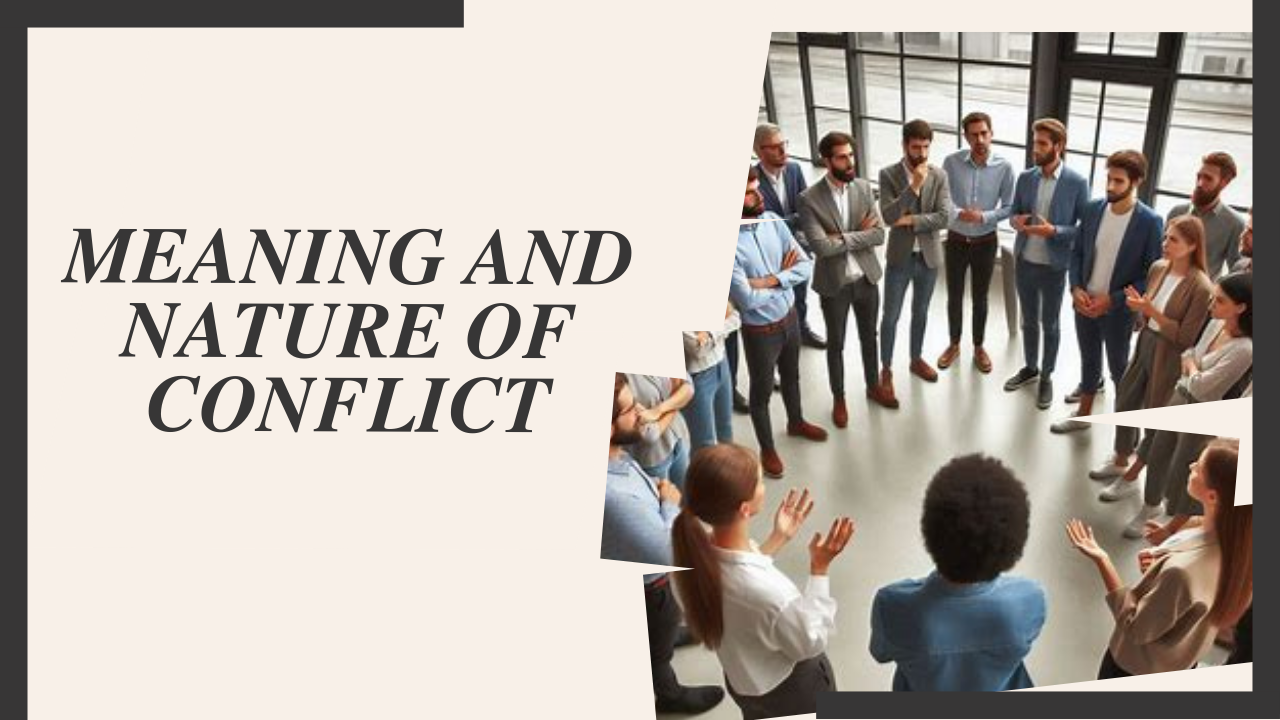Meaning and Nature of Conflict in Organizational Behavior
Conflict is a normal part of life and occurs when people have different ideas, opinions or goals. This can happen between individuals, groups or even within ourselves when we are unsure about what to do. Conflict is often related to stress and can make it difficult to make decisions, especially in a group or organization. Understanding the nature of conflict helps us to better deal with it and find ways to resolve disagreements.
Table of Contents
Meaning of Conflict
Conflict in simple words termed as disagreement and argument. Conflict arises when thoughts, view, of individual are different from each other. Conflict is interrelated to stress. Conflict occurs when people disagree or argue because they have different ideas, opinions, or goals. It occurs when individuals or groups do not agree with each other and their interests or values do not match. This disagreement can cause stress and make it difficult to make decisions, especially in a group or organization.
Definition of Conflict
Conflict is define as Disagreement between individual or a group within an organization, there is a breakdown in decision making because of incompatible.
Conflict arises when individual or a group disagree with each other and when goals, interest or values are incompatible.
Conflict is disagreement or confrontation between individuals or groups due to differing ideas, interests, or values, often leading to tension or stress in decision making.
For example: Imagine that two friends, Sarah and Arya, are planning a vacation together. Sarah wants to go to the mountains because she likes hiking, while Arya wants to go to the beach because she likes swimming. They begin to argue because they have different tastes and cannot agree on where they should go. This disagreement between them is an example of conflict.
Nature of Conflict
1. Conflict is a Psychological State of Mind
Conflict often occurs when a person is unsure about what they should do. It is like being stuck in a dilemma, wondering whether to take action or not. This confusion can cause a person to delay making a decision because they are unsure.
Explanation: Conflict often begins in our minds when we are unsure about what decision to make. Imagine you are offered a new job that pays well but requires you to move away from your family. You may feel torn between doing the job or staying close to your loved ones. This internal conflict, where you are confused about what to do, is a psychological conflict. It causes stress because you are caught between two choices.
Example: A student is deciding whether to study for an important exam or go to a party with friends. The conflict arises from the internal conflict about whether to focus on studying or having fun.
2. Conflict is usually about Small Matters
Conflict usually involves minor disagreements and is more about arguments rather than physical fights. It is a situation where people talk or argue about their differences, not a physical confrontation.
Explanation: Most conflict involves small disagreements rather than big, physical confrontations. These conflicts are usually verbal, where people argue or disagree about something small. It is more about a difference in opinion than a physical fight.
Example: Two co-workers might argue about who should take over a certain task at work. The disagreement can get heated, but it is not a physical fight – just a difference in opinion about who should do the job.
3. Conflict is Universal
Conflict can occur anywhere and at any time. It is not limited to one place or situation. People around the world experience conflict because it is a part of human nature.
Explanation: Conflict is not limited to one place, group or situation. It can happen anywhere, at any time and with anyone. Whether you are at home, school, work or in different parts of the world, conflict can occur because people have different ideas and viewpoints.
Example: Conflict can occur between family members in India, between co-workers in the United States, or even between friends in Japan. It doesn’t matter where you are – conflict is a part of life everywhere.
4. Conflict is Inevitable
Conflict is something that cannot be avoided. Nobody plans for conflict; they occur naturally because everyone has different opinions and perspectives.
Explanation: Conflicts are inevitable because people naturally have different opinions, desires, and needs. Even if we try to avoid it, conflicts still occur because it is part of human nature. No one plans for conflict, but it happens because we all think and feel differently.
Example: In a group project, one person wants to do things one way, while another person wants to do it differently. Despite everyone’s best efforts to work together smoothly, conflict arises because of these different opinions.
5. Conflict arises due to a Lack of Resources
Conflict often occurs when there are limited resources, such as money or materials, and people compete for them. When resources are scarce, people have different ideas about how to best use them, leading to disagreements.
Explanation: When resources such as money, time, or materials are limited, people often compete for them. This competition can lead to disagreement because everyone has their own ideas about how to use these scarce resources. When there are not enough resources, conflict is more likely to occur.
Example: Imagine a family has three children, but they only have money to buy two new toys. The children may argue over who gets the toys, which can lead to conflict because there are not enough resources for everyone.
6. Disagreements based on Behavioral Expectations
Conflict can arise when someone does not act the way we expect them to. When we expect the other person to behave as per our expectations and when that person does not behave as per our expectations then it will be a matter of conflict. For example, during unforeseen events such as the COVID-19 pandemic, things did not go as planned, leading to arguments about how to handle limited resources. Conflict can arise when expectations from people or situations are not met.
Explanation: Conflict can also occur when someone does not behave the way we expect them to. We often have expectations about how people should act, and when those expectations are not met, this can lead to disagreement. This can also happen when things don’t go as planned due to unforeseen events, causing stress and conflict.
Example: During the COVID-19 pandemic, many businesses faced conflict because their employees were expected to work from home, while some employers wanted them to return to the office. The unforeseen situation led to disagreements because expectations were not aligned.
Frequently Asked Questions (FAQ) About Conflict
What is conflict?
Why does conflict happen?
Is conflict avoidable?
Is conflict always bad?
How can conflicts be resolved?
What are common causes of conflict?
Where does conflict usually occur?
What’s the difference between a conflict and a fight?
How can I manage conflict in my life?
Why is it important to understand conflict?
Conclusion Of Nature of Conflict
Conflict is something we all experience, no matter where we are or who we are with. It is a natural part of life that arises when people have different ideas, needs or expectations. Although conflicts can be challenging, understanding their nature and causes can help us to manage them more effectively. By recognizing that conflicts are often over minor matters and are part of human nature, we can work towards finding solutions that satisfy everyone involved.








Thank you for your sharing. I am worried that I lack creative ideas. It is your article that makes me full of hope. Thank you. But, I have a question, can you help me?
Glad to hear that! Feel free to ask your question.
Your article helped me a lot, is there any more related content? Thanks!
Thanks for sharing. I read many of your blog posts, cool, your blog is very good.
Good write-up, I¦m regular visitor of one¦s web site, maintain up the nice operate, and It is going to be a regular visitor for a lengthy time.
Thanks for sharing. I read many of your blog posts, cool, your blog is very good.
Your article helped me a lot, is there any more related content? Thanks!
Your article helped me a lot, is there any more related content? Thanks!